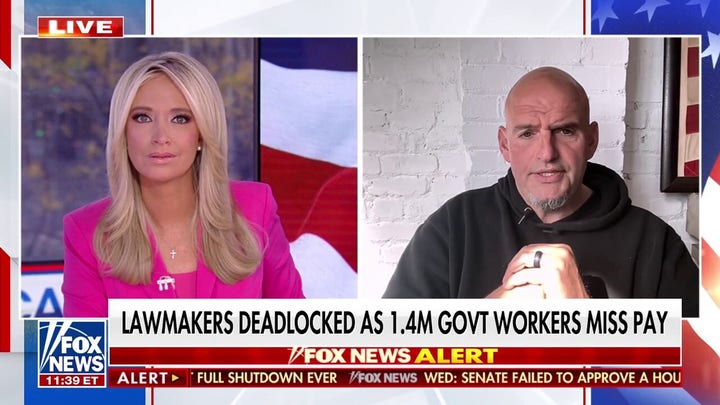Senate Democrats railed against Republicans and the Trump administration’s argument that the well had run dry on federal food stamp benefits given that President Donald Trump funded the program during the last shutdown.
Over the weekend, the U.S. Department of Agriculture warned in a memo that because of the ongoing shutdown and lack of appropriations, funding for food stamps, also known as the Supplemental Nutrition Assistance Program (SNAP), would run out by Nov. 1.
Despite there being an emergency contingency fund of roughly $5 billion, the USDA argued that the emergency funding was not ‘legally available.’
However, Senate Minority Leader Chuck Schumer, D-N.Y., and Senate Democrats argued at a press conference on Wednesday that Trump had funded SNAP during the last government shutdown in 2019. Sonny Perdue, Trump’s agriculture secretary at the time, announced that SNAP funding would be available while Washington was still in the throes of that partial government shutdown.
‘They funded it under Trump in the last shutdown,’ Schumer said. ‘So, don’t believe the bull.’
Both Senate Republicans and Democrats have made legislative efforts to avert the SNAP funding cliff, which, if not avoided on Saturday, would see 42 million people lose their food benefits.
But Senate Majority Leader John Thune, R-S.D., doubled down on his stance against one-off bills, or so-called ‘rifle shots’ that would fund certain programs or pay some federal workers, which lawmakers have been pushing in the background.
‘I think that the quickest way to end it is to just open everything up and then everybody gets paid,’ Thune said. ‘You’re not picking winners and losers or having to explain to this group why you open it up to this group. I mean, that just doesn’t make any sense to me.’
Schumer said Senate Democrats would support bills from both Sen. Josh Hawley, R-Mo., and Sen. Ben Ray Luján, D-N.M., that would fund the program. Lujan’s bill, which was announced earlier this week, would also fund the Special Supplemental Nutrition Program for Women, Infants and Children (WIC).
Luján argued that the administration had changed course from a previous plan that would have seen SNAP funded.
‘It’s bull—-,’ he said. ‘I’ll say, I come from a small farm, I know the difference of good soil and the bull—- that goes in. And this is the bull—- taking these plans down to try to lie to the American people and justify why it’s OK for people to go hungry, 40 million people.’
It’s not clear, meanwhile, whether the same appetite for such legislation exists in the House.
Rep. Joe Neguse, D-Colo., led a press conference alongside Democrats on the House Agriculture Committee to demand the Trump administration tap into the SNAP emergency fund before Nov. 1.
When asked by Fox News Digital whether he was coordinating with the Senate on either the GOP or Democrat-led bills, Neguse said, ‘I’m familiar with the proposals, and I know that many of my colleagues … have proposed legislation here in the House as well. Those conversations will continue.’
But ,’ultimately,’ he said, ‘legislation doesn’t need to be passed in order for these funds to be released. It is the law.’
‘The Trump administration is required to release those funds today. That is why the administration is now embroiled in federal litigation in federal court, in Massachusetts, that I ultimately think will be successful,’ Neguse said.
Still, Senate Republicans argue that the best path forward to avert the SNAP funding cliff, along with other upcoming paydays and deadlines, was to reopen the government. So far, Schumer and Senate Democrats have voted 13 times against reopening the government as the shutdown inches toward shattering the 35-day record etched into the history books in 2019.
It runs counter to the congressional Democrats’ previously held position, too. For example, in 2023, when lawmakers were again tasked with averting another shutdown, Schumer warned that if funding was not extended, millions of New Yorkers would go without food benefits.
Schumer shifted blame for the ongoing shutdown and the likelihood that SNAP benefits will run dry to Republicans.
‘We are saying the Republicans can fund it now, and they’re using these people as hostages, plain and simple next, that’s the answer,’ Schumer said. ‘The answer is they can fund it right now.’


